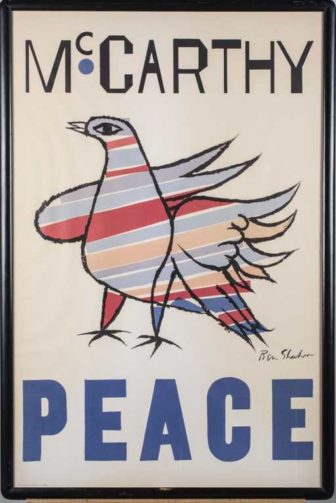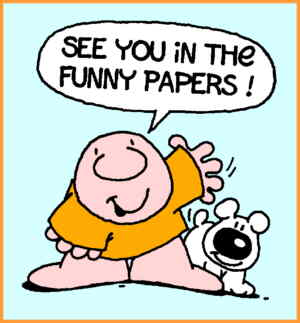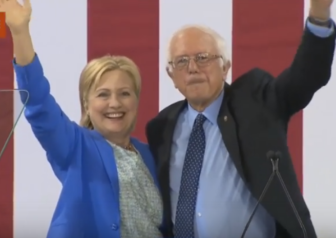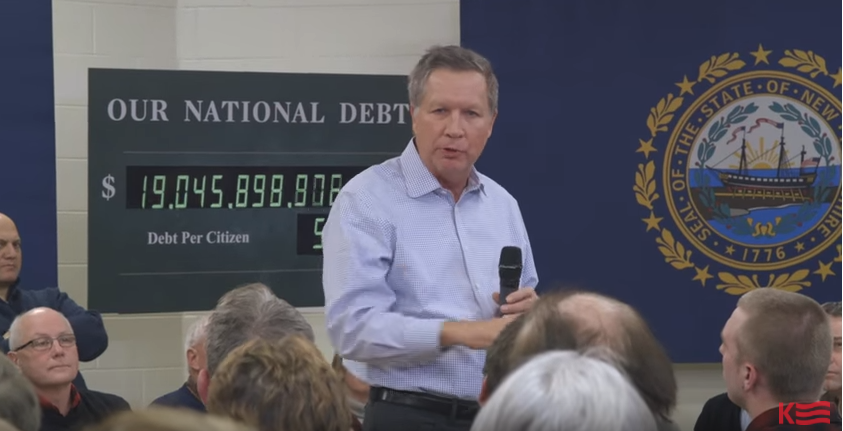By Michael Davidow, Radio Free New Hampshire
I’m usually pleased when the  Michael Davidow of Manchester[/caption]
Michael Davidow of Manchester[/caption]
He would be running as a Republican, against a Republican president. And the Times pointed out that he would be facing stiff opposition. Trump is apparently popular here in New Hampshire, and very few party regulars are willing to go out on a limb to take him on.

Eugene McCarthy for President poster by Ben Shahn
So far so good. I wrote similarly about Senator Jeff Flake’s chances. From there, though, our themes differed. I tried to put Flake’s situation into perspective, showing how running against an incumbent is always difficult, but also showing how it can sometimes make a difference: Gene McCarthy’s campaign against Lyndon Johnson in 1968 being the best example thereof. And I also wished the best for our friend from Arizona. Because New Hampshire’s primaries are both fun and consequential.
The Times played their article for laughs. They not only talked about the odds against Kasich; they also made fun of his mangling the name of some kid he met (old-fashioned campaigning, apparently, isn’t very cool), they criticized him for his big ego (they must know some people who want to be president, but who lack big egos), and they wrote off his chances with a chuckle (they apparently think that someone else will come along — someone not from Toledo, perhaps– and make those long odds magically disappear).

Wikipedia
Ziggy
They could have written an article that both recognized Kasich’s uphill battle but also showed the worth of his fight. They could have mentioned Senator Flake’s thoughts on that subject. They could have added some history, or some insight into New Hampshire’s particular role in these matters. But they chose against those things. They did all but illustrate their report of Kasich’s adventures in our state with a picture of Ziggy, that old cartoon character who looked like a bag of paste. Cue Nancy West and her curatorial abilities.
Interestingly enough, they also put their ever-so-slightly-superior article on their front page, which tells me that someone must have felt conflicted about it: that someone, somewhere in Manhattan’s rarefied air, somehow realized that the likelihood of a primary challenge against Mr. Trump was, in fact, real news. The Times doesn’t shy away from criticizing Trump, after all. They hardly let a day go by without taking a handful of increasingly predictable whacks against him.
And I should add this, as well: I have been reading the New York Times since law school. I remember when their photographs were printed in black and white. I remember when their pages were physically larger. And I remember when they assigned a reporter to Hillary Clinton’s campaign team, more than 600 days before Clinton declared her candidacy, when she was still pretending to be undecided (because pretending to be undecided, after all, allowed her to pretend to be thoughtful about her reasons for running, with “naked ambition” typically failing to poll well); and I remember them explaining why they did so: because they believed she was about to make history. I also remember how deftly they snubbed the Sanders campaign after that, and how clear they were later still, about how clearly Clinton would beat Trump.

YouTube
Hillary Clinton is pictured with Sen. Bernie Sanders at Portsmouth rally in 2016.
Here, then, is some food for thought, for the New York Times. In the ultimate irony of all, because she lost to a television star, Clinton’s campaign was informed from beginning to end by artificiality raised to the level of principle. She ran with the assumption that her actual thoughts and feelings did not matter; that appearances alone counted, because “the people” were apparently dumb enough to fall for that. She was Wall Street’s senator, bought and paid for, and plenty of voters would have loved for that (those people used to be called Republicans); but that had to be kept a secret. With Sanders talking about the poor and downtrodden, she also had to pretend to care about those types; so she did, and she sounded like a cheap kazoo. Trump pretended better, and Trump won.
So what ultimately irked me about that Times article about John Kasich was this: they were so busy being smarter than him, and cooler than him, and humbler than him, all at once, that they failed to give that man his due. He cares about his party and he cares about his country. Those are real things, and they matter. We can always make fun of him later, after he wins.
Michael Davidow is a lawyer in Nashua. He is the author of Gate City, Split Thirty, and The Rocketdyne Commission, three novels about politics and advertising which, taken together, form The Henry Bell Project. His books are available on Amazon.
Views expressed in columns and opinion pieces are those of the author and do not reflect those of InDepthNH.org.





